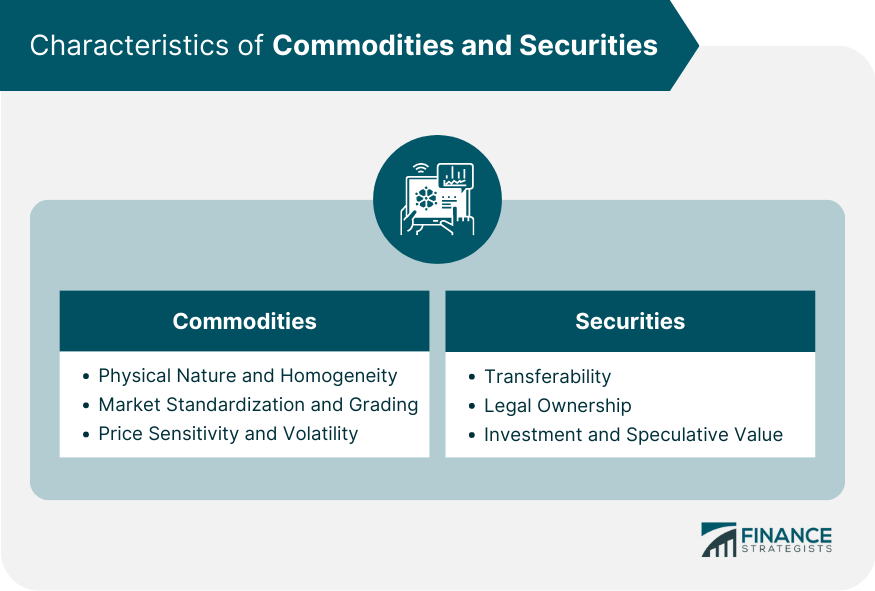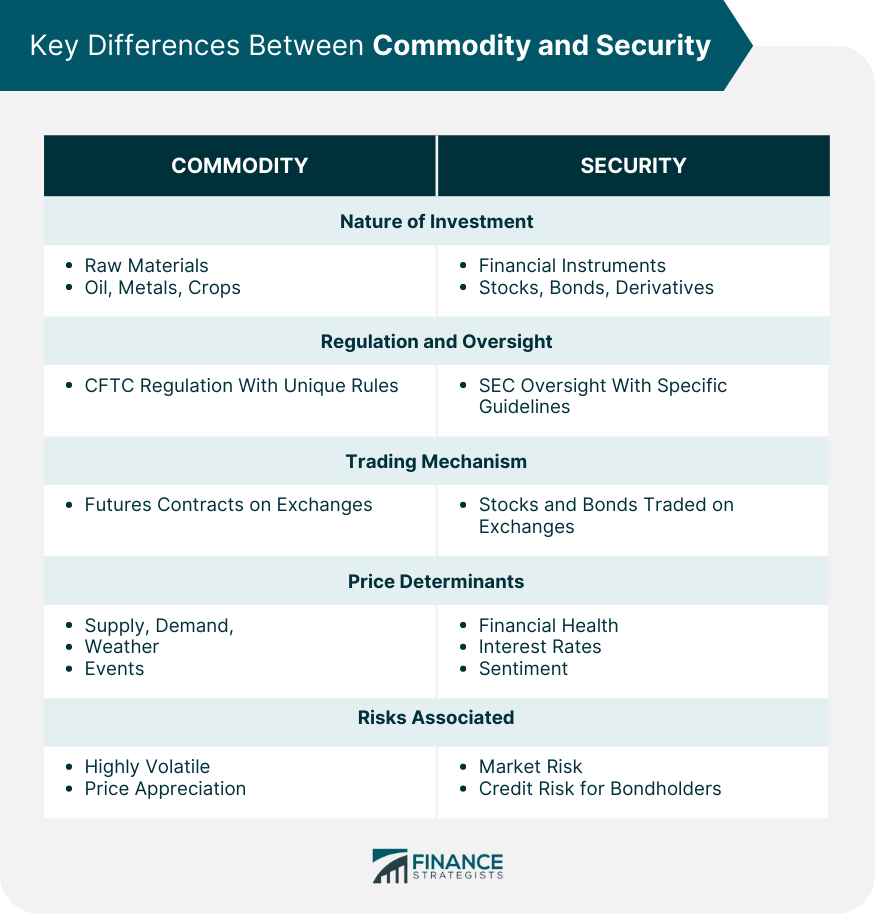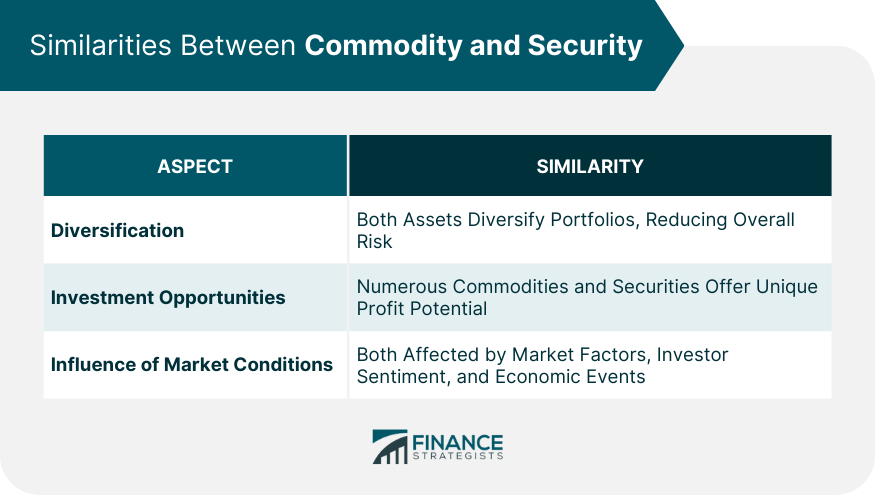Commodities, in their simplest form, are raw materials or primary agricultural products that can be bought, sold, or traded. These encompass a wide range of goods, including energy resources like oil and gas, agricultural produce such as corn or wheat, and precious metals like gold or silver. A security, on the other hand, is a financial instrument that holds monetary value. It represents an ownership position in a publicly-traded corporation (stock), a creditor relationship with a governmental body or a corporation (bond). Securities usually provide an investment avenue for individuals and firms, offering the potential for returns in the form of interest, income, or appreciation in value. While both commodities and securities represent investment opportunities, the primary difference lies in their nature. Commodities are basic goods used in commerce that are interchangeable with other commodities of the same type. Securities, however, represent a claim on part of a company's assets and earnings. Commodities are most often used as inputs in the production of other goods or services. Their quality may differ slightly, but it is essentially uniform across producers. When they are traded on an exchange, commodities must also meet specific minimum standards, known as basic grades. These basic grades are designed to ensure that it is a homogenous product across various markets, further emphasizing the fungible nature of commodities. Commodities are physical and tangible assets. These range from agricultural products, like wheat and corn, to natural resources like oil, gas, and precious metals. One key characteristic of commodities is their homogeneity. A unit of a commodity is essentially identical to another unit of the same grade, irrespective of its source. This homogeneity is vital in facilitating the trading process as it ensures that any given unit of the commodity can substitute another. In commodity markets, commodities are standardized and graded. The Chicago Board of Trade (CBOT), for instance, sets stringent standards for what can be traded under a specific commodity designation. For a batch of grain to be classified as No. 2 yellow corn, it must meet certain criteria, such as a specific moisture content. This standardization facilitates trading by ensuring all parties have a clear understanding of the product's quality. Commodity prices are sensitive to factors such as weather, geopolitical events, and changes in supply and demand dynamics. As a result, commodity prices can be quite volatile. Price fluctuations can occur rapidly and without warning, influenced by any number of unpredictable events, from a poor harvest due to adverse weather to a surge in demand from emerging markets. A security is a broad term for shares, bonds, or any other financial instruments that hold monetary value. Securities are tradable financial assets th at offer an avenue for investment, presenting the opportunity for returns in the form of dividends, interest, or capital appreciation. They act as a claim on part of a company's assets and earnings. Securities come in many forms, including equities (stocks), debt securities (bonds), derivatives (options or futures), mutual funds, or exchange-traded funds (ETFs). Securities are readily transferable, making them desirable investment vehicles. Shares of stock, for example, can be bought and sold on stock exchanges, and ownership can be transferred with relative ease. This ease of transfer increases the liquidity of securities, making them an attractive option for investors. A crucial characteristic of a security is the legal claim it provides to the owner. Whether it's a share of a company's stock or a government bond, ownership of a security often implies a degree of control or a claim on assets. This ownership can take different forms, from voting rights in company decisions for shareholders to a claim on future cash flows for bondholders. Securities serve as attractive instruments for both investment and speculation. From a long-term investment perspective, securities such as stocks and bonds offer returns through capital appreciation and income generation. From a speculative standpoint, derivatives such as options and futures provide opportunities for significant profits, albeit with higher risk. The fundamental nature of the investment differentiates commodities from securities. When you invest in commodities, you're investing in basic raw materials. These could range from oil and natural gas to wheat, corn, or precious metals like gold or silver. On the other hand, investing in securities involves buying financial instruments that represent a certain value. These could be shares in a company, bonds issued by governments or corporations, or derivative products linked to various underlying assets. In the United States, for example, commodities markets are primarily regulated by the Commodity Futures Trading Commission (CFTC), while the Securities and Exchange Commission (SEC) oversees the securities markets. These regulatory bodies have different rules and guidelines, impacting how these assets are traded and what information must be disclosed to investors. Commodities are often traded via futures contracts on exchanges like the Chicago Mercantile Exchange (CME), where parties agree to buy or sell a certain amount of a commodity at a future date at a predetermined price. Securities, on the other hand, are typically bought and sold on exchanges such as the New York Stock Exchange (NYSE) or the Nasdaq, where ownership is transferred immediately, and payment is settled within a short timeframe. Different factors determine the prices of commodities and securities. Commodity prices are primarily influenced by supply and demand dynamics. For example, a poor harvest can reduce the supply of a crop, driving up its price. Alternatively, a surge in demand for a commodity, perhaps due to economic growth in emerging markets, can also push up prices. Securities prices, on the other hand, are influenced by a host of factors, including the financial health of the issuing company or government, prevailing interest rates, investor sentiment, and broader economic indicators. Commodity prices are extremely volatile and can be affected by unforeseeable factors such as weather conditions or geopolitical events. Commodities also don't generate income in the way securities do, meaning investors rely solely on price appreciation for returns. Investing in securities, however, involves risks such as market risk, where the price of the security could fall due to factors like economic developments or changes in investor sentiment. There's also credit risk, particularly for bond investors, where the issuer might fail to make interest or principal payments. Both commodities and securities play a crucial role in diversifying an investment portfolio. By having a mix of these assets, investors can spread their risk across different asset classes, potentially reducing the overall risk of their portfolio. There are hundreds of different commodities and thousands of different securities to choose from, each offering unique opportunities for profit and each responding differently to market conditions. Both commodities and securities are affected by broader market conditions. While the specific factors that influence their prices may differ, both are subject to the whims of investor sentiment, economic indicators, and geopolitical events. Choosing between investing in commodities or securities largely depends on an individual's investment goals, risk tolerance, and investment knowledge. For investors looking for stable income and lower risk, securities like bonds or dividend-paying stocks can be an attractive option. These investment vehicles provide regular income in the form of interest or dividends, and their prices are typically less volatile than those of commodities. On the other hand, commodities can offer strong potential for price appreciation, particularly during periods of economic growth or inflation. However, the prices of commodities can be volatile, and investing in commodities can require a deep understanding of complex factors that can affect these prices. An investor's decision should also consider the tax implications of investing in commodities or securities, as these can vary depending on the investor's country of residence. Commodities are raw materials or agricultural products traded on exchanges and are characterized by their physical nature, homogeneity, and sensitivity to market forces. On the other hand, securities represent financial instruments such as stocks, bonds, or derivatives that offer transferability, legal ownership, and potential returns through investment and speculation. The key difference between the two lies in their nature. Commodities are tangible goods traded based on supply and demand dynamics, while securities represent ownership in companies or governments and are influenced by financial health indicators. Both commodities and securities play a crucial role in diversifying investment portfolios and are influenced by market conditions. The choice between the two depends on individual investment goals, risk tolerance, and knowledge. Securities offer stable income and lower risk, making them suitable for income-focused investors, while commodities can offer potential price appreciation but carry higher volatility and require a deeper understanding of market forces. Investors should carefully consider their investment objectives and tax implications when making their choice.Overview of Commodity and Security
What Is a Commodity?
Characteristics of Commodities
Physical Nature and Homogeneity
Market Standardization and Grading
Price Sensitivity and Volatility
What Is a Security?
Characteristics of Securities
Transferability
Legal Ownership
Investment and Speculative Value

Key Differences Between Commodity and Security
Nature of Investment
Regulation and Oversight
Trading Mechanism
Price Determinants
Risks Associated

Similarities Between Commodity and Security
Role in Diversification
Investment Opportunities
Influence of Market Conditions

How to Choose Between Commodities and Securities
Conclusion
Difference Between a Commodity and a Security FAQs
Commodities are basic goods used in commerce that are interchangeable with other commodities of the same type.
Securities are financial instruments that hold some form of monetary value. They represent an ownership position in a publicly-traded corporation (stock), a creditor relationship with a governmental body or a corporation (bond), or rights to ownership as those represented by an option, subscription right, and subscription warrant.
The primary difference between commodities and securities lies in their nature. Commodities are basic goods used in commerce that are interchangeable with other commodities of the same type. Securities, however, represent a claim on part of a company's assets and earnings.
Commodity prices are extremely volatile and can be affected by unforeseeable factors such as weather conditions or geopolitical events. Securities, on the other hand, involve risks such as market risk, where the price of the security could fall due to factors like economic developments or changes in investor sentiment.
Choosing between investing in commodities or securities largely depends on your investment goals, risk tolerance, and investment knowledge. You should also consider the tax implications of your investments, as these can vary depending on your country of residence.
True Tamplin is a published author, public speaker, CEO of UpDigital, and founder of Finance Strategists.
True is a Certified Educator in Personal Finance (CEPF®), author of The Handy Financial Ratios Guide, a member of the Society for Advancing Business Editing and Writing, contributes to his financial education site, Finance Strategists, and has spoken to various financial communities such as the CFA Institute, as well as university students like his Alma mater, Biola University, where he received a bachelor of science in business and data analytics.
To learn more about True, visit his personal website or view his author profiles on Amazon, Nasdaq and Forbes.











